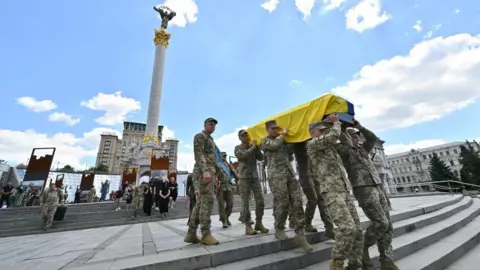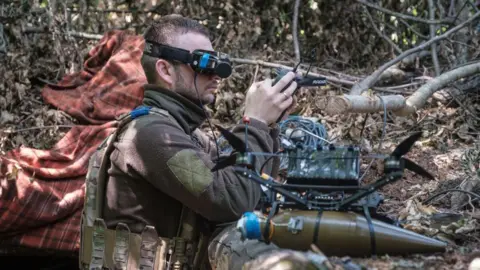It’s hoped a new mobilisation law, which came into force last month, will help give troops like those fighting on the eastern bank a rest.
“It won’t change anything!” says Boston, a flamethrower unit commander who is still fighting on the eastern bank. Boston is his military code name.
He sends us videos of him on patrol in Krynky by the riverside. At one point he shoots a Russian anti-personnel mine hidden beneath the sand.
“People should join the army from 20,” he says. “But there is a problem, a lot of men went abroad [to escape the draft]. No-one wants to come back, no-one wants to fight, and no-one wants to die.”
‘Yesterday’s civilians’
We put their testimonies to Dmytro Pletenchuk, the spokesman for Ukraine’s South Defence Forces.
“Compared to Russian losses, ours are significantly smaller,” he explains. “Secondly, we lose soldiers on this part of the front line no more than in other areas."
 Getty Images
Getty ImagesBy definition, a conscript will never be as motivated as a volunteer. It’s also easier to inspire troops when fighting is going your way. For Ukraine, and especially on the eastern bank, it isn’t.
It’s possibly why Mr Pletenchuk strikes a sympathetic tone when we tell him about allegations of troop disobedience on the eastern bank.
“Those who have been forced to defend their country are yesterday’s civilians,” says Mr Pletenchuk with a smile. “They will of course have a different perception of the army."
Ahead of the arrival of more Western military aid, Ukrainian generals believe Russia is trying to expand the battlefield and further stretch their defending units.
Invading troops are more than a month into a north-eastern ground offensive, and while Ukraine has slowed their advances, there’s been no letting up.
It’s why Oleksiy now finds himself hundreds of kilometres away from the Kherson region.
“Everything happened in a hurry and there was no preparation,” he says.
“Everyone is here: marines, air assault forces, the State Border Guard Service, regular infantry, territorial defence and national police.”
“There are also more drones in the sky compared to the east bank of the Dnipro.”
 Getty Images
Getty ImagesRussia on the front foot
Moscow is currently on top in this industrialised conflict, with Kyiv struggling to counter its manpower, weaponry, and tactics.
Ukrainian President Volodymyr Zelensky concedes time is running out for a diplomatic solution which favours Ukraine, which is why he recently held a peace summit in Switzerland.
It was about building global support for peace on his terms. While almost 80 countries signed the agreement in Geneva then - and more have since - important regional powers in Africa, the Middle East and South Asia have not.
Russia wasn’t invited, but before the meeting, Vladimir Putin had demanded Ukrainian troops withdraw from four regions which he partially occupies.
His conditions are as maximalist as they are unrealistic, but his battlefield dominance means a potential peace deal could better match his terms than Kyiv’s.
President Zelensky admits his priority is to simply hold the front line. If his troops manage that before the arrival of autumn and more difficult fighting conditions, it would be viewed as a success.
Also, he claims there are still plans for a counter offensive in the future.
If Oleksiy survives defending the Kharkiv region, he could find himself back at Ukraine’s “hellish” river crossing in the south.
Additional reporting by Anastasiia Levchenko and Hanna Chornous